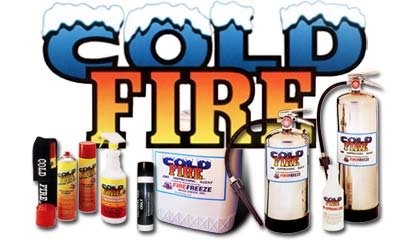MarkT
FRF Addict
- Joined
- Mar 4, 2010
- Posts
- 1,202
- Reaction score
- 26
Dry Chemical Extinguisher "tips"
Dan mentioned maintenance... At a yard I used to run we had this great guy that came every year to service our fire extinguishers. He was a retired firefighter... then after 30+ more years in the fire extinguisher business he finally retired for good... he was nearly 90 years old at the time but you would have never known it...
I asked him a lot of questions over the years... and he showed me once why dry chemical extinguishers need servicing, especially those used in vehicles.
He took an extinguisher that was just removed from one of our trucks after a year in service. It was still fully charged. He discharged it into a special can he had on his truck. Almost nothing came out but air! (technically, nitrogen) Then he removed the valve and showed me how the powder had become packed solid in the extinguisher from the constant vibration and bouncing going down the road.
He took a second extinguisher, same age, from another truck but this time he rapped it several times with a rubber mallet before discharging it. This one discharged fully!
Then he gave the first extinguisher... the one with the dry chemical packed solid... a few raps with the mallet. He was able to pour out the contents easily.
His advice about the personal fire extinguishers I owned? Unless required by law, he didn't feel it was necessary to service an extinguisher every year if it held pressure... But he said that it was very important, especially on vehicle mounted extinguishers, to take it out of the car and rap it hard with a rubber mallet every couple of months. On an extinguisher mounted in the house or garage, he recommended the "rap" method once a year.
(one exception... the "cheapy" extinguishers with plastic valves that can't be serviced? he recommended against those and said they should just be thrown away every year.)
One of the things that upset him about the business was that so many "inspectors" would check the gauge and if it looked good, slap on a tag good for another year. He never did this. He discharged, disassembled, inspected, and refilled every dry chemical extinguisher we had every year.
I still follow his advice... but of course getting an extinguisher serviced or replaced every year is probably the best practice. (There is a feed tube inside the extinguisher that can break off... rare on a quality model but I saw two older ones we had with this issue).
Just make sure the company servicing actually does more than slap a new tag on it! And a good rap with a mallet every once in a while between services seems to be a good idea.
Dan mentioned maintenance... At a yard I used to run we had this great guy that came every year to service our fire extinguishers. He was a retired firefighter... then after 30+ more years in the fire extinguisher business he finally retired for good... he was nearly 90 years old at the time but you would have never known it...
I asked him a lot of questions over the years... and he showed me once why dry chemical extinguishers need servicing, especially those used in vehicles.
He took an extinguisher that was just removed from one of our trucks after a year in service. It was still fully charged. He discharged it into a special can he had on his truck. Almost nothing came out but air! (technically, nitrogen) Then he removed the valve and showed me how the powder had become packed solid in the extinguisher from the constant vibration and bouncing going down the road.
He took a second extinguisher, same age, from another truck but this time he rapped it several times with a rubber mallet before discharging it. This one discharged fully!
Then he gave the first extinguisher... the one with the dry chemical packed solid... a few raps with the mallet. He was able to pour out the contents easily.
His advice about the personal fire extinguishers I owned? Unless required by law, he didn't feel it was necessary to service an extinguisher every year if it held pressure... But he said that it was very important, especially on vehicle mounted extinguishers, to take it out of the car and rap it hard with a rubber mallet every couple of months. On an extinguisher mounted in the house or garage, he recommended the "rap" method once a year.
(one exception... the "cheapy" extinguishers with plastic valves that can't be serviced? he recommended against those and said they should just be thrown away every year.)
One of the things that upset him about the business was that so many "inspectors" would check the gauge and if it looked good, slap on a tag good for another year. He never did this. He discharged, disassembled, inspected, and refilled every dry chemical extinguisher we had every year.
I still follow his advice... but of course getting an extinguisher serviced or replaced every year is probably the best practice. (There is a feed tube inside the extinguisher that can break off... rare on a quality model but I saw two older ones we had with this issue).
Just make sure the company servicing actually does more than slap a new tag on it! And a good rap with a mallet every once in a while between services seems to be a good idea.








